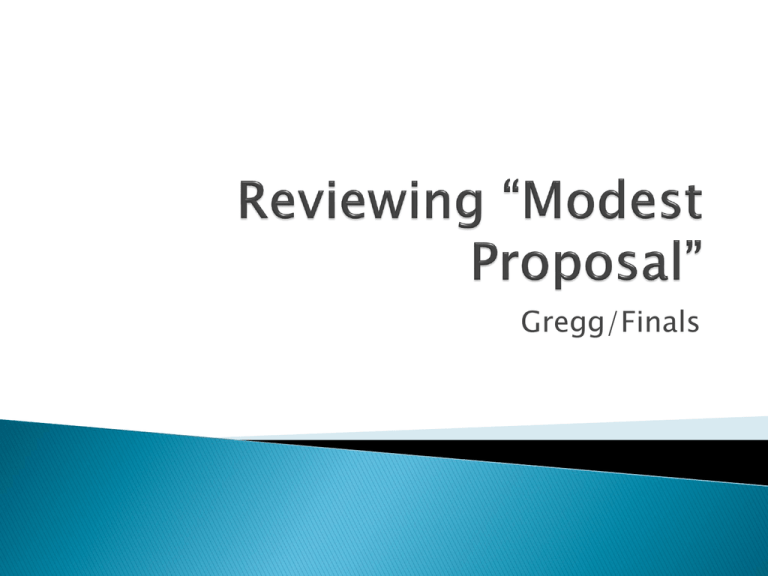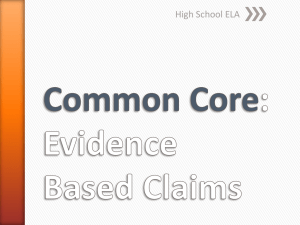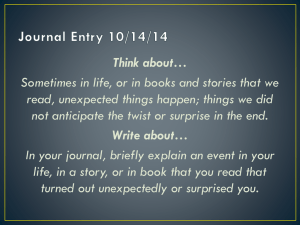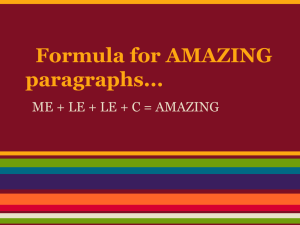Reviewing modest proposal for finals
advertisement

Gregg/Finals Which of the following contributes to the tone of the first paragraph the LEAST? ◦ ◦ ◦ ◦ ◦ “melancholy object” “crowded with beggars” “forced to employ” “helpless infants” “fight for the Pretender” Determine what the tone of the first paragraph is – sad, depressing Parse each phrase to see if it contributes to that particular tone: 1) 2) ◦ ◦ ◦ ◦ ◦ “melancholy object” - yep “crowded with beggars” – uh-huh “forced to employ” - maybe “helpless infants” - definitely “fight for the Pretender” – no – he’s annoyed, not depressed E: All the other choices show how helpless and trapped in poverty the people are, while choice E mentions the one “acceptable” job possible to the men, entering the army. In comparison to the first paragraph, the second and third paragraphs are: I. less sympathetic to the poor II. more logical and less emotional III. factual rather than satirical in tone a. I only b. II only c. III only d. I and II only e. I and III only The first paragraph expresses some sympathy for the poor, “a melancholy object” to observers. The children are “all in rags” and infants are “helpless”. We knew that… The 2nd and 3rd paragraphs refer to the poor children as “a very great additional grievance” and proceed with a cold, logical analysis of the problem. The 2nd and 3rd paragraphs are satirical, referring to a process for making poor children “profitable” and are purely conjectural rather than factual. So, the answer is D: I and II only. In the 4th and 5th paragraphs, the narrator asserts all of the following EXCEPT that a. other proposed solutions are based on erroneous numbers and bad calculations b. poor children are often starving and poorly dressed c. the shame of being unwed overrules all other considerations d. most babies need little more than their mother’s milk in their first year of life e. children of one year of age shall become very valuable to their country as well as to their parents C: the shame of being unwed overrules all other considerations. The narrator asserts that, in fact, it is the financial burden or lack of money to care of a child that leads to termination of the child’s life by the mother, “more to avoid the expense than the shame”. “That art” (end of paragraph 6) refers to ◦ ◦ ◦ ◦ ◦ breeding building houses farming stealing governing D: stealing. All the lines from 77 to 87 refer to children being able to support themselves by theft, an “art” that is seldom mastered until they are at least six years old. In paragraph 9, the narrator implies that Americans are ◦ ◦ ◦ ◦ ◦ extremely knowledgeable reassuring cannibalistic gourmands talented in cooking C: cannibalistic. The “very knowing American” “assured” the narrator that a “year old” child is “most delicious”, which implies that the American has eaten a fellow human being. In paragraph 10, which of the following contributes to the central imagery the LEAST? ◦ “twenty thousand may be reserved for a breed” ◦ “a circumstance not much regarded by our savages” ◦ “one male will be sufficient to serve four females” ◦ “may at a year old be offered for sale” ◦ “the fore or hind quarter will make a reasonable dish” B: a circumstance not much regarded by our savages. The “circumstance” referred to is “marriage”, a human social convention and religious ceremony, but the central imagery of the paragraph is that of breeding, sale, slaughter, and preparation of the meat in terms usually reserved for a discussion of cattle, sheep, pigs, etc. Throughout the passage, the narrator ◦ is convinced of his superiority and secure in his arrogance ◦ is extremely humble and reticent in his presentation ◦ wavers between bold certitude and self-effacing humility ◦ repeatedly asserts his qualifications and problem-solving abilities ◦ boasts that he is the only one to offer solutions to the problem The narrator sometimes boldly asserts his ideas as the only way, then abruptly shifts to “humbly propose...which I hope will not be liable to the least objection”. He then shifts back to offering an “expert” opinion on the use of the “food” and then shifts again to “I do therefore humbly offer”. Thus the narrator wavers between confidence and humility. C: wavers between bold certitude and selfeffacing humility. (2nd hour: 56% missed this question, 5th hour: 75% missed it) The overall tone of the passage could best be described as ◦ ◦ ◦ ◦ ◦ logical detached scientific humorous satirical E: satirical. The passage is a satirical attack on the ill treatment of the poor of Ireland. The author’s real feelings are revealed in his details of the extremity of the poverty (paragraphs 1, 5, 6). The wording comparing children to animals, referring to the word “carcasses”, and the last sentence about the “dishes” are extreme satire since no humans in their right minds in Europe in the 1700s would actually advocate the selling and eating of babies as a new industry and source of income. This extremity rules our merely “humorous” as best answer. The last sentence of paragraph 27 ◦ serves to reinforce the first sentence of the paragraph ◦ is ironic given the content of its paragraph and the following one ◦ acts as a brief summation of the paragraph ◦ diverts the reader from the horror of the preceding clause ◦ is redundant and thus unnecessary to the overall meaning of the paragraph But this, and many others, I omit, being studious of brevity. The last sentence of paragraph 27 ◦ serves to reinforce the first sentence of the paragraph First sentence: Many other advantages might be enumerated. Hmmm…doesn’t seem to be any connection. Scratch a. The last sentence of paragraph 27 ◦ acts as a brief summation of the paragraph – hmmm…maybe. He does talk about recipes…so he could be omitting additional ones. ◦ diverts the reader from the horror of the preceding clause – ok, could be that one too, because it is pretty gross… is redundant and thus unnecessary to the overall meaning of the paragraph – no, this won’t work because it’s not redundant b: is ironic given the content of its paragraph and the following one The statement about omitting “this and many others…being studious of brevity” is ironic because “this” refers to what the author has just gone into great detail about in the first paragraph and what he continues to give even more details about in the next paragraph. He does just the opposite of what he states he will do. 2nd hour: 56% got it wrong 5th hour: 65% got it wrong the first sentence is paragraph 29 is ironic because ◦ obviously people would object to a decline in the population ◦ he is actually advocating something beneficial to the people ◦ the kingdom needs to increase its population, not decrease it ◦ his proposal would improve the lives of the people in the kingdom ◦ the obvious objection to his proposal is its coldhearted cruelty E: the obvious objection… The narrator says he cannot think of a single reason to object to his proposal except a decline in population, when in fact there are many reasons to object to raising babies to be “food”, and extremely cruel suggestion that would raise many moral and religious objections. In the same paragraph, the narrator castigates all of the following EXCEPT ◦ ◦ ◦ ◦ ◦ women Laplanders Jews landlords shopkeepers Castigate: criticize harshly; punish in order to correct What does he say about each group? Women: “Of curing the expensiveness of pride, vanity, idleness, and gaming in our women” – does that sound like criticism? Uh, yeah. Laplanders: “Of learning to love our country, wherein we differ even from Laplanders” – if we’re DIFFERENT from the Laplanders because we DON’T love our country, then they obviously DO love their country. Not really criticism, is it? ◦ Jews – “nor acting any longer like the Jews, who were murdering one another at the very moment their city was taken” – pretty critical, calling people murderers ◦ Landlords – “Of teaching landlords to have at least one degree of mercy towards their tenants” – clearly, landlords WEREN’T merciful or they wouldn’t need to learn it, so that doesn’t work ◦ Shopkeepers – “putting a spirit of honesty, industry, and skill into our shop-keepers, who, if a resolution could now be taken to buy only our native goods, would immediately unite to cheat” – this calls shopkeepers dishonest, lazy and lacking in skill…it’s critical In the same paragraph, the narrator castigates all of the following EXCEPT ◦ ◦ ◦ ◦ ◦ women Laplanders Jews landlords shopkeepers So the answer is B: Laplanders. The narrator praises Laplanders for loving their country; he accuses all the other groups of various “bad” behaviors. (2nd hour: 70%, 5th hour: 45%) The tone of the paragraph 30 could best be described as ◦ ◦ ◦ ◦ ◦ satirical desperate cynical humorous hesitant C: cynical. The lines express a very cynical belief that there is no “hope that there will ever be some sincere attempt” at solving the problem of poverty in a real way, the ways the author has previously detailed in italics. This is a very pessimistic, distrustful view of society. The irony of the last paragraph lies in the fact that ◦ although the narrator says he would not benefit since his wife is past child-bearing, he could easily remarry a younger woman ◦ the narrator says that he has no personal interest, yet he does since he lives in Ireland ◦ although the narrator professes to have only the public good in mind, he would attain great fame if his proposal were adopted ◦ the narrator would not profit from the proposal, but neither would he be faced with the prospect of selling his baby ◦ the narrator’s proposal would help the rich and the merchants as much as it would help the poor people for whom he says he is concerned D: the narrator would not profit… The narrator professes no personal interest since he would not make a penny himself, yet he is also quick to point out that his children are too old to be “sold”, thus sparing himself and his wife the personal anguish of “selling” their own children. The avoidance of the emotional consequences of his own proposal is an obvious “gain”. The narrator uses all of the following rhetorical techniques EXCEPT ◦ ◦ ◦ ◦ ◦ logic syllogistic reasoning repetition allegory rhetorical question ◦ logic – reasoning or argumentation ◦ syllogistic reasoning – a type of argument in which a conclusion is based on two premises; a subtle, sophisticated, or deceptive argument (ex: Premise 1: If I do not wake up, then I cannot go to work. Premise 2: If I cannot go to work, then I will not get paid. Conclusion: Therefore, if I do not wake up, then I will not get paid.) ◦ repetition – repeated utterance; reiteration ◦ allegory – a symbolic narrative, usually spiritual in meaning ◦ rhetorical question - a question asked solely to produce an effect or to make an assertion and not to elicit a reply ◦ Logic - evident in the numbers and financial figuring ◦ syllogistic reasoning - in the final argument about why the narrator has no personal interest in the proposal (children = profit); I have no children; therefore I have no profit). ◦ Repetition - present throughout (of taxing…of using…of curing) ◦ Allegory ◦ rhetorical question - in the second to last paragraph (“First, As things now stand, how they will be able to find food and raiment for a hundred thousand useless mouths and backs?”) D: allegory. There are no allegories in the passage. The intent of the author of this passage most probably is to ◦ shock politicians into addressing the problems of the poor ◦ express his anger at the poor who begged on the streets ◦ entertain his readers with his fantastic proposal ◦ offend a society that had rejected and belittled his ideas ◦ offer a possible solution to a long-standing problem A: shock politicians into addressing the problems of the poor. The author’s “proposal” to eat babies is obviously shocking, and his mention of realistic solutions is an indication of the laws that he would really like the Parliament to enact. Question Question Question Question Question Question Question Question Question 1: 2: 3: 4: 5: 6: 7: 8: 9: 30% 23% 32% 11% 34% 26% 64% 32% 66% Question Question Question Question Question Question 10: 11: 12: 13: 14: 15: 30% 60% 57% 53% 79% 26% 4 passages 54 multiple choice questions Use a scantron Yes, you may use a dictionary, but I would answer the question first if possible, or come back to it later if you need the dictionary! You will have 90 minutes to answer the number of questions that you will have 60 minutes to answer on the REAL AP test







